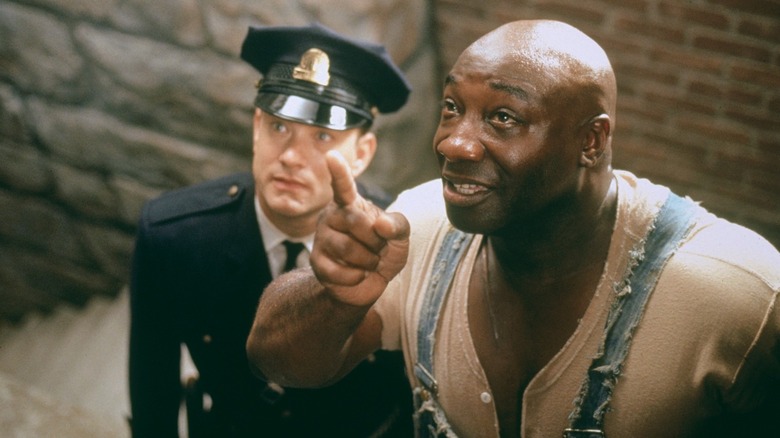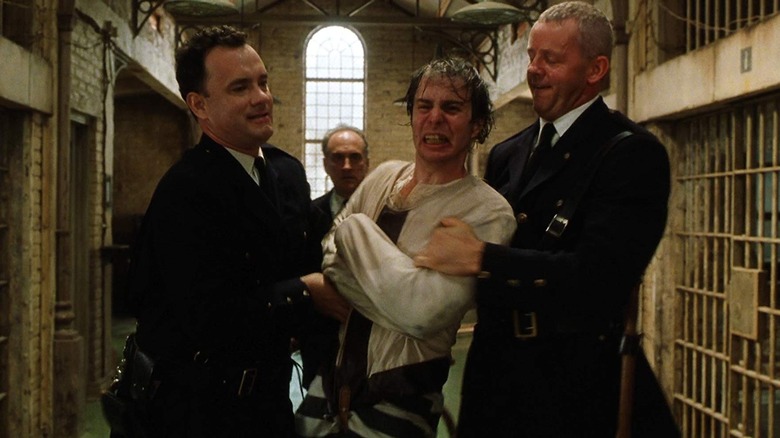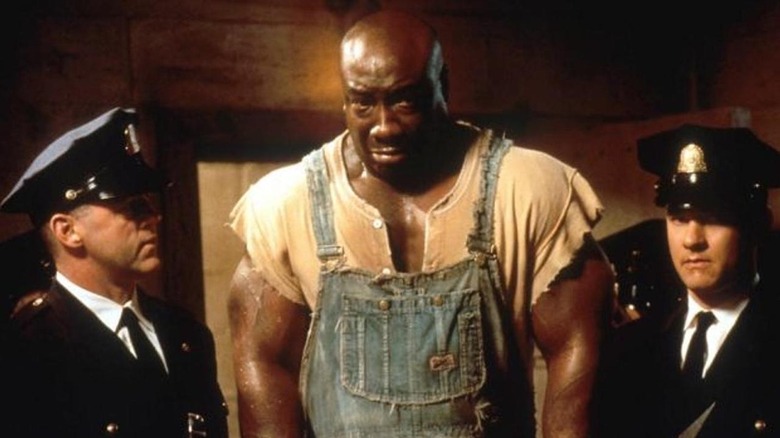The Shawshank Redemption Made The Green Mile A Risky Move For Frank Darabont
We may receive a commission on purchases made from links.
Frank Darabont created a heckuva conundrum for himself when his feature directing debut, "The Shawshank Redemption," wound up becoming one of the most beloved movies of all time. For starters, he joined an elite fraternity of filmmakers who'd hit the bullseye with a difficult-to-adapt Stephen King story. More troublesome, King had just launched into another prison yarn, one that begged to become a motion picture. One that fit Darabont like a bespoke suit.
"The Green Mile" was a publishing event in 1996. Between March and August, King released a new, slender volume imparting the tragedy of John Coffey, a gentle giant wrongfully consigned to Death Row for the rape and murder of two girls. Unlike "The Shawshank Redemption," this serialized story contained the kind of mystical elements one expects from a King novel. Coffey is not only the opposite of a killer, he is a saint possessed of healing powers. King knew he had a winner on his hands, so he went straight to the director who'd just done justice by his other tale of incarceration. And he didn't get an immediate "Yes."
Back in the ol' hoosegow
In an interview with Charlie Rose (this was obviously more than a few years ago), Darabont revealed that King had approached him about "The Green Mile" before he began writing it:
"[H]e said ... I've been toying with this idea I'm thinking of writing, let me tell you about it. You're not gonna want to do it, it's another prison thing,' and I said, 'You're right Stephen, I'm not gonna want to do it, but tell me anyway.' And he told me this idea, and I was intrigued enough that I said, 'Oh well, okay you're right. I'm not gonna want to do it, but give me first crack at it if you ever write the thing.'"
King was a man of his word, which worked out sensationally well for Darabont. After the director read the first installment, he knew he had to make the movie. "[W]hen I read that first book" he recalled thinking, "'Oh my gosh, I'm going back to prison. I have no choice.' I could see where Steve is here. You know, I know his work so well, I knew he was going someplace very special with this."
Breaking Darabont out of director's jail
Was this the right move for Darabont career-wise? In the short term, the gig paid off with four Academy Award nominations, including one for Best Picture and Darabont's second nod for Best Adapted Screenplay. It was also, despite its three-hour run time, a box office hit, grossing $136 million domestically. Darabont had more than earned his parole from prison movies, and he used it to make "The Majestic," a Capraesque fable that felt out of step in the immediate, jingoistic wake of 9/11, but might have resonated more deeply in an era when Americans' basic freedoms are under attack at home.
Darabont rebounded artistically with "The Mist," and successfully shepherded "The Walking Dead" to television. But after TNT canceled his promising noir series, "Mob City," he basically transitioned back to for-hire screenwriting — and not by choice. In 2021, he told Mick Garris he'd written a U.S. Civil War film based on a treatment by Stanley Kubrick (developed alongside historian Shelby Foote) that failed to earn him a single studio meeting. Darabont is far too talented a filmmaker to be on the outside looking in. He's more than overdue for a jailbreak.


